

Pdars.arc.nasa.gov/flightcognition/Publications/ChapterOne.pdf. Www.sagepub.com/upm-data/32324_01_Kidd_&_Czerniawski_Ch_01.pdf. Facilitating learning and change in groups and group sessions. Facilitating learning and change in groups and group sessions.
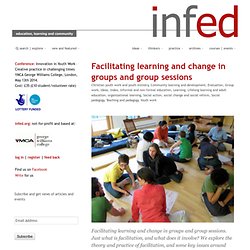
Just what is facilitation, and what does it involve? We explore the theory and practice of facilitation, and some key issues around facilitating group sessions. Contents: introduction · what is group facilitation? · core conditions and the facilitator · the facilitator’s role · core values · facilitating sessions – having a plan · facilitating sessions – thinking of beginnings, middles and ends · facilitating – responding to the moment · dealing with difficult behaviour · conclusion · further reading and references · acknowledgements · how to cite this piece. Teaching Mathematics in Secondary Schools: A Reader - Linda Haggarty. Mathematics Inside the Black Box: Assessment for Learning in the Mathematics ... - Dylan Wiliam. Becoming a Successful Teacher of Mathematics - Howard Tanner, Sonia Jones. Learning How to Learn: Tools for Schools.
Learning how to learn is an essential preparation for lifelong learning.
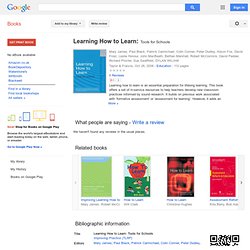
This book offers a set of in-service resources to help teachers develop new classroom practices informed by sound research. It builds on previous work associated with ‘formative assessment’ or ‘assessment for learning’. However, it adds an important new dimension by taking account of the conditions within schools that are conducive to the promotion, in classrooms, of learning how to learn as an extension of assessment for learning. Among the materials included you will find: an introductory in-service session self-evaluation questionnaires an action planning activity workshops tools for school development a network mapping activity guidance about different ways of using the resources teachers descriptions of ways they have used of adapted them references to further information and advice.
For the Learning of Mathematics, Vol. 29, No. 1 (Mar., 2009), pp. 40-47. Early Professional Development for Teachers - Frank Banks, Ann Shelton Mayes.
Www.learningpt.org/pdfs/FormativeAssessment.pdf. Encyclopedia of Primary Education - Denis Hayes. Unique in its field, the Encyclopedia of Primary Education brings together a wide-ranging body of information relating to current educational practice in a single indispensable volume.
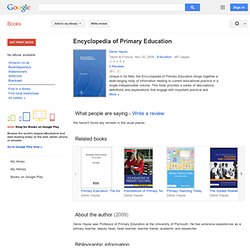
This book provides a series of descriptions, definitions and explanations that engage with important practical and conceptual ideas in primary education and contains over 500 entries incorporating: Curriculum subjects, themes and topics Theories, policies and educational controversies Pedagogical terms relating to teaching and learning Commentaries on current issues in primary education Influential figures in education, both past and present The impact of educational research on policy and practice. Wp-content/uploads/2010/11/TISME-The-National-Curriculum-Review.pdf. Howard Gardner's Multiple Intelligences. Howard Gardner theorized that there are multiple intelligences, and that we all use one or two for the most effective learning.
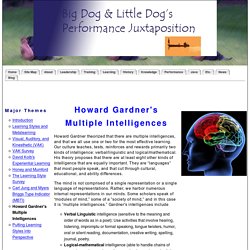
Our culture teaches, tests, reinforces and rewards primarily two kinds of intelligence: verbal/linguistic and logical/mathematical. His theory proposes that there are at least eight other kinds of intelligence that are equally important. They are “languages” that most people speak, and that cut through cultural, educational, and ability differences. The mind is not comprised of a single representation or a single language of representations. Rather, we harbor numerous internal representations in our minds. Verbal Linguistic intelligence (sensitive to the meaning and order of words as in a poet): Use activities that involve hearing, listening, impromptu or formal speaking, tongue twisters, humor, oral or silent reading, documentation, creative writing, spelling, journal, poetry.
Munro and munro 1992 effective learning. Surviving and Succeeding in Difficult Classrooms - Paul Blum. Www.recsam.edu.my/R%26D_Journals/YEAR2010/june2010vol1/ewegnoh(86-109).pdf. Mathematics: made to measure. Classroom Discussions: Using Math Talk to Help Students Learn, Grades K-6 - Suzanne H. Chapin, Catherine O'Connor, Nancy Canavan Anderson. 21st Century Learning. Home. Applying Piaget to Education ‘Each time one prematurely teaches a child something he could have discovered for himself, that child is kept from inventing it and consequently from understanding it completely.’
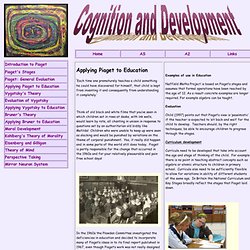
Think of old black and white films that you’ve seen in which children sat in rows at desks, with ink wells, would learn by rote, all chanting in unison in response to questions set by an authoritarian old biddy like Matilda! Children who were unable to keep up were seen as slacking and would be punished by variations on the theme of corporal punishment. Yes, it really did happen and in some parts of the world still does today. OFSTED 'Outstanding'... who me? Never! Observations can be one of the most stressful experiences in a teachers job.
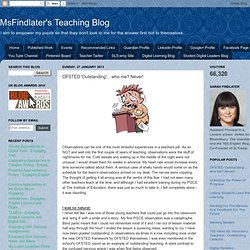
As an NQT and well into the first couple of years of teaching, observations were the stuff of nightmares for me. Cold sweats and waking up in the middle of the night were not unusual. I would dread them for weeks in advance. My heart rate would increase every time someone talked about them. A serious case of shaky hands would come on as the schedule for the team's observations arrived on my desk. I was no natural: I never felt like I was one of those young teachers that could just go into the classroom and 'wing it' with a smile and a story.
The six secrets of a happy classroom - Schools - Education. Apparently it is the same minority of top pupils, usually sitting at the front, who raise their hands to answer questions, while the majority switch off and opt out.
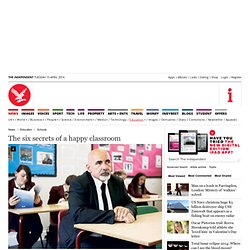
According to the education expert Professor Dylan Wiliam, this ingrained, almost sacrosanct, classroom habit is widening the achievement gap in our schools. "Only a quarter of pupils consistently put their hands up," he says. "They can't wait to take part, while others switch off completely. " Some sort of randomisation process is required, Wiliam long ago decided, and his unorthodox solution, as demonstrated in a new BBC2 series, The Classroom Experiment (part of the channel's very welcome School Season of programmes), is to write the pupils' names down on lollipop sticks, the teacher then pulling them at random from a pot. No one can hide – everyone is potentially in the firing line. "The programme is a crystallisation of things I've been doing for a long while," Wiliam says.
Www.prometheanworld.com/rx_content/files/DOC/EffectsofTechnology-EnhancedFormativeAssessment-169674.pdf. Using "Think-Time" and "Wait-Time" Skillfully in the Classroom. ERIC Identifier: ED370885 Publication Date: 1994-05-00 Author: Stahl, Robert J.
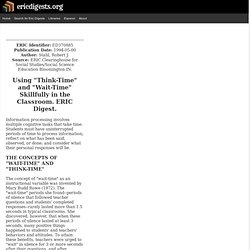
Source: ERIC Clearinghouse for Social Studies/Social Science Education Bloomington IN. Information processing involves multiple cognitive tasks that take time. Students must have uninterrupted periods of time to process information; reflect on what has been said, observed, or done; and consider what their personal responses will be. The concept of "wait-time" as an instructional variable was invented by Mary Budd Rowe (1972). An Introduction to Classroom Observation: Amazon.co.uk: Ted Wragg. Asking Better Questions. 2nd ed. - Morgan, Norah, Saxton, Juliana. Asking Better Questions explores the compelling role of questions in creating a powerful learning environment.
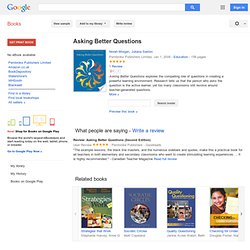
Research tells us that the person who asks the question is the active learner, yet too many classrooms still revolve around teacher-generated questions. This revision of a classic teacher resource recognizes that it takes time and diligence to become an effective questioner. Based on extensive classroom experience, this comprehensive guide: Strand 4 - Senior Cycle - Project Maths - Learning and teaching for the 21st Century.
Www.projectmaths.ie/documents/workshops/algebra_matching_W5.pdf.